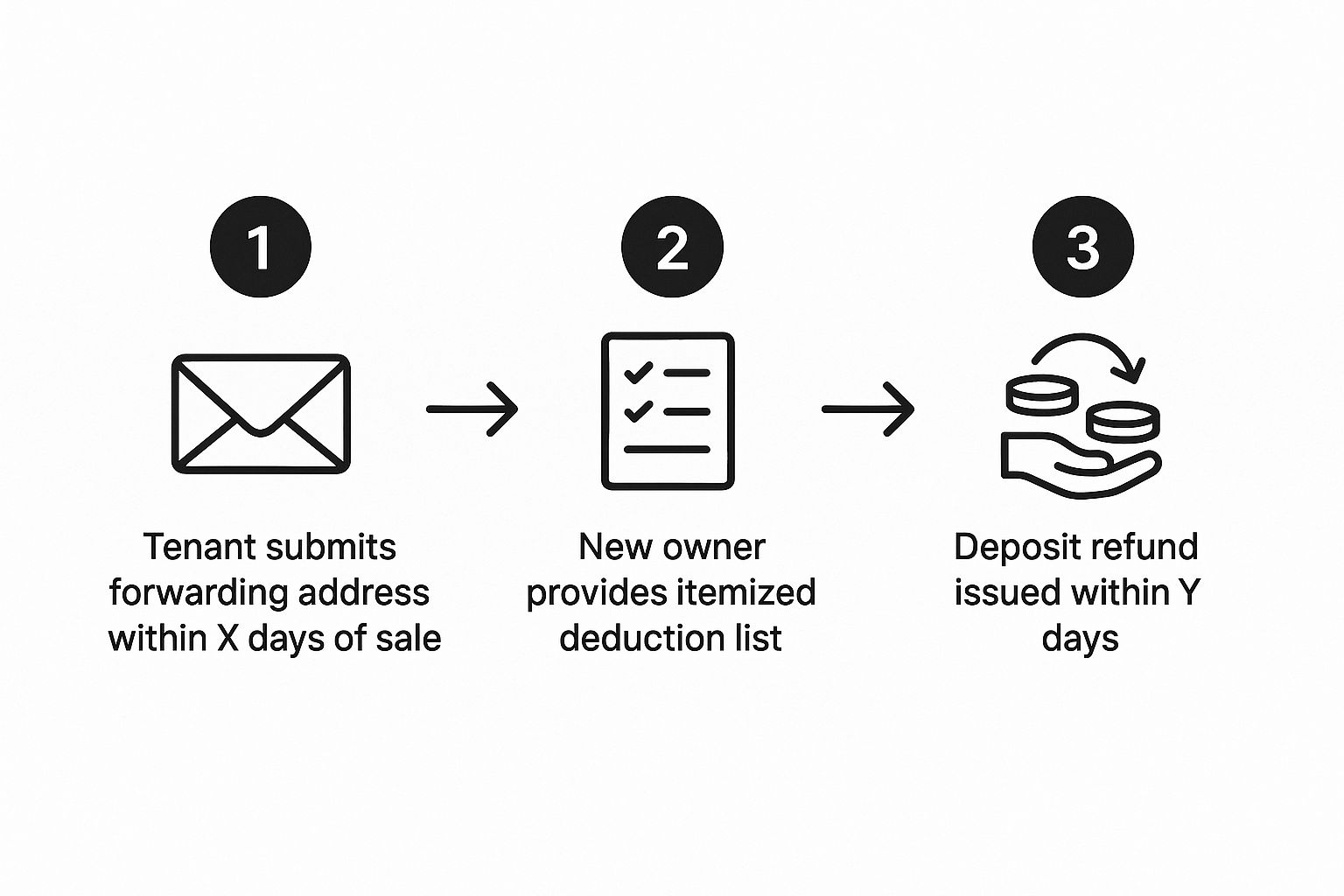Learn your tenants rights when landlord sells property in BC. Discover key rules on notices, leases, and showings for Vancouver & Fraser Valley renters.
READ MORE
When a "For Sale" sign pops up on the lawn of your rental in Vancouver or the Fraser Valley, it's natural to feel a jolt of anxiety. Your first thought is probably, "Do I have to move?" In British Columbia, the answer is a clear and simple no. Your tenancy agreement is a powerful document that remains valid even after the property changes hands.
The law in BC, specifically the Residential Tenancy Act, is designed to protect you, ensuring your tenancy continues with the new owner under the exact same terms you have now.
Seeing your rental home listed for sale can be unsettling, particularly in the competitive rental markets of Vancouver and the Fraser Valley. But here's the good news: the Residential Tenancy Act (RTA) has your back. Your lease is legally tied to the property itself, not to the person who owns it.
Think of it like a ship getting a new captain—the voyage continues, and all the rules on board stay exactly the same. The new owner simply inherits your current tenancy agreement, whether you're on a fixed-term lease or a month-to-month arrangement. This legal continuity is the bedrock of tenants' rights when a landlord sells a property in BC.
Your fundamental rights and obligations don't change one bit. The new owner must step directly into the shoes of your previous landlord.
This means:
This framework is built to provide stability for you during the transition. For property owners, understanding these responsibilities is also a crucial part of a smooth sales process, as outlined in guides for selling your home with tenants in place.
Recent data from the Canada Mortgage and Housing Corporation (CMHC) shows vacancy rates in Metro Vancouver remain critically low, making these legal protections more important than ever. Knowing your lease transfers automatically provides immediate peace of mind.
To make these key points even clearer, here’s a quick summary table of your most important rights.
This table should help you feel confident about where you stand.
Ultimately, the sale of the property does not automatically end your tenancy. The new owner can only ask you to leave under a few very specific conditions allowed by the RTA, which we'll dive into later. For now, rest assured that your home remains your home.

This is the big one. The most important thing to understand when your landlord sells is that your tenancy agreement is a powerful shield. Its protections don't just vanish when the property changes hands. In British Columbia, the law is crystal clear: your lease simply transfers to the new owner.
Think of your lease as a contract that's attached to the physical property itself, not to the person who owns it. When the title deed gets transferred to the new owner, so does the responsibility to uphold every word of your rental agreement. The new owner legally steps into the shoes of your old landlord, inheriting every term, condition, and obligation you both agreed to.
Whether you have a fixed-term or a month-to-month lease, this core principle of continuity holds true. The specifics, however, play out a little differently for each.
Fixed-Term Lease: If you're in the middle of a one-year lease, you are legally entitled to stay until the very last day of that term. The new owner can't end your tenancy early just because they bought the place. They have to honour the agreement until it expires, and only then can they negotiate a new lease or take steps to end the tenancy for a legally valid reason.
Month-to-Month Tenancy: If your tenancy is on a month-to-month basis, the agreement also continues without any interruption under the exact same terms. The new owner becomes your landlord, and everything carries on just as it did before the sale.
This automatic transfer provides crucial stability for renters all across BC, from Vancouver to the Fraser Valley. It ensures that a property sale doesn't mean you're suddenly facing an eviction.
According to the Residential Tenancy Act (RTA), the new owner assumes all the rights and responsibilities of the original landlord. This means they are just as responsible for repairs, maintenance, and respecting your privacy as the previous owner was.
A common worry for tenants is what happens to their security deposit and any pet damage deposit. You can breathe easy here. The RTA makes sure these funds are protected during the transition.
Your deposits must be formally transferred from the seller to the buyer as part of the property's sale. The new owner then becomes responsible for holding that money in trust and returning it to you at the end of your tenancy, following all the standard rules. You absolutely do not need to pay a new deposit.
This seamless transfer ensures your funds stay safe and accounted for. Managing these crucial legal and financial details is a key function of professional property management services, which help ensure full compliance for both owners and tenants.

Let's be honest: having strangers parade through your home is probably the most disruptive part of a landlord selling the property. The good news is that your right to quiet enjoyment is legally protected under BC's Residential Tenancy Act (RTA), which puts strict rules in place for property viewings. These rules are designed to balance the landlord's need to sell with your right to live your life without constant interruptions.
First things first, your landlord can't just show up unannounced with a real estate agent. For every single showing, they are legally required to give you a minimum of 24 hours written notice. This isn't a friendly suggestion—it's the law, and it's there to protect your sense of security and control over your home.
The written notice your landlord provides has to be specific. It’s not good enough for them to just say they’ll be showing the unit "sometime this week." That's too vague and doesn't meet the legal standard.
A proper notice must clearly state:
This formal process makes sure that tenants' rights are respected when a landlord sells a property. It prevents an endless, unpredictable stream of people coming through your space. And remember, you don't have to leave your home during showings. It is absolutely your right to be there while potential buyers are looking around.
In hot markets like Vancouver and the Fraser Valley, showings can get pretty frequent. If they become so excessive that they're seriously disrupting your life, you have the right to ask for a more reasonable, structured schedule. If your landlord isn't cooperative, you can apply for dispute resolution with the Residential Tenancy Branch.
What about photos and videos? With nearly all listings posted online, it's natural to worry about pictures of your personal belongings being shared publicly. The RTA is a bit of a grey area on this specific issue, but your fundamental privacy rights still apply.
Generally, a landlord can take photos of the unit itself for marketing. However, they should make a reasonable effort to avoid capturing your personal items, like family photos, important documents, or other valuables. The best approach is to talk to your landlord about this before they start taking pictures.
You can also be proactive to protect your privacy:
Clear, open communication is your most powerful tool. Often, you can work with your landlord to create a showing schedule that respects your daily life—for instance, limiting viewings to two specific days a week. A collaborative approach like this can make the entire process a lot less stressful for everyone involved.
This is the big one, isn't it? The question every tenant asks when their building gets sold: can the new owner kick me out? The short answer is yes, but only in a very specific situation that is tightly controlled by the law.
This isn’t some loophole for them to exploit. The rule is called "landlord's use of property," and it comes with a formal process and strict rules designed to protect you from being pushed out unfairly.
The new owner can't just decide they want a different tenant or that they could get more rent from someone else. To legally end your tenancy, they must have a genuine, good-faith intention to move into the unit themselves. This right also covers their "close family members," a term the Residential Tenancy Act (RTA) defines very narrowly: a parent, spouse, or child of the new owner or their spouse. No cousins, no nephews, no best friends.
If the new owner's situation fits these specific criteria, they have to follow the legal process to the letter. They can't just text you and ask you to leave.
They are required to serve you with an official Two Month Notice to End Tenancy for Landlord's Use of Property (RTB-32). The key here is "good faith." They have to genuinely plan on living there. The Residential Tenancy Branch (RTB) takes this very seriously, especially with the high-profile "bad faith" eviction cases often reported in the Vancouver media.
If a new owner issues this notice and then, a few months later, you see your old place listed for a higher rent, they've broken the law. The RTA gives you powerful recourse: you can apply for compensation equal to 12 months' rent if the landlord fails to use the property for its stated purpose for at least six months.
Getting an eviction notice is stressful and expensive. The law recognizes this. When you receive a two-month notice for landlord's use, you are legally entitled to compensation equal to one month's rent.
You have two ways to get this. The landlord can pay you the money directly, or you can simply choose not to pay rent for your final month. This is your right, and it helps cover the costs of moving in competitive markets like Vancouver or the Fraser Valley. For a deeper dive into the legal duties of a property owner, there are many landlord resources that spell out these responsibilities clearly.
The rules around your security deposit also have a strict timeline to make sure you get your money back promptly after you move out.
This infographic breaks down the clear, step-by-step process for handling your security deposit when your tenancy ends.

As the visual guide shows, the new owner has firm deadlines they must meet for either returning your deposit or giving you an itemized list of any deductions.
So, while a new owner can end your tenancy to move in, they must follow a highly regulated process. It gives you proper notice, financial compensation, and a way to fight back if they act in bad faith. You are never expected to just pack up your life overnight.
So, your landlord is selling the place. It's not uncommon for the new buyer to want the property completely empty when they take possession. Maybe they have big renovation plans, or they intend to move in themselves. In some cases, you'll find landlords seeking a swift cash sale who want to offer the new owner a clean slate.
When this happens, your current landlord or even the prospective buyer might approach you with a financial offer to move out early. This is what the industry calls a 'cash for keys' deal. It's a straightforward, private negotiation: they offer you money, and in return, you agree to end your tenancy and hand over the keys.
The most important thing to remember here is that you are never obligated to accept. Your tenancy agreement is a legally binding contract, and you have every right to stay.
Before you even think about accepting, you need to do some real-world math. A few thousand dollars might sound tempting, but does it truly cover the cost of uprooting your life in BC's notoriously expensive rental market?
A landlord's desire for a vacant property is their problem, not yours. Any offer should reflect the major inconvenience they're asking you to endure.
Get a calculator and start tallying up the real costs:
A classic mistake tenants make is grabbing an offer that just covers the moving truck. That’s not a serious offer. A fair deal compensates you for giving up your legal right to stay in your home.
Let's say you negotiate a deal you feel is genuinely fair. A handshake or a simple email is not going to cut it. To protect yourself, the agreement must be documented on the correct, official form to be legally binding.
The only way to formalize this process is by signing the Mutual Agreement to End a Tenancy (RTB-8). This is the official document from the Residential Tenancy Branch. Once signed by both you and the landlord, it establishes a firm, legally recognized end date for your tenancy.
Without a signed RTB-8, any 'cash for keys' deal is completely unenforceable, and from a legal standpoint, your tenancy continues as if nothing happened. This form is a critical tool for protecting your rights as a tenant when a landlord sells.
To keep up with the latest on tenancy laws and other important property topics, be sure to check out our property management news section.
Knowing your rights as a tenant is one thing, but making sure they’re respected is a whole different ball game. What happens if your landlord just ignores the Residential Tenancy Act (RTA)? Maybe they show up for a viewing without any notice, constantly pressure you to move out, or slap an invalid eviction notice on your door.
When this happens, you don't just have to take it. Your first and most powerful resource is BC's Residential Tenancy Branch (RTB). This is the official body that referees disputes between landlords and tenants, and they have the authority to make things right. Don't let violations slide; you can file an application for dispute resolution to formally address any breaches.
If you're heading into a dispute, you absolutely need proof. An RTB arbitrator can't act on your word alone—they need solid evidence that your rights were violated. The moment you suspect trouble, start documenting everything.
Here’s what you’ll need to build a strong case:
When a landlord infringes on your right to quiet enjoyment—say, with way too many showings or by popping in unannounced—you may be entitled to a monetary order. This is financial compensation for the stress and disruption their failure to follow the law has caused you.
After hearing from both you and your landlord, an RTB arbitrator has the power to issue legally binding orders. These aren't just friendly suggestions; they are enforceable decisions with real consequences.
The results can include a monetary order, which forces your landlord to pay you for damages or for the loss of quiet enjoyment you suffered. An arbitrator could also issue an order of compliance, which is a legal directive telling your landlord they must follow the RTA—for example, by restricting showings to reasonable hours.
It’s always smart to have your own next steps planned. To get a head start on your next move, you can prepare by completing a new rental application ahead of time so you're ready when you find the right place.

When the home you're renting goes up for sale, it's natural to have a lot of questions. Let's tackle some of the most common concerns tenants have during this process so you can feel confident about your rights.
Absolutely not. The fact that the property is being sold is not a valid reason to increase your rent beyond the annual limit set by the BC government.
Your landlord is still required to give you the proper notice and follow all the standard legal guidelines for rent increases, regardless of the sale.
Nope, you are under no obligation to sign a new tenancy agreement. Your existing lease—with all its original terms and conditions—automatically transfers over to the new owner. They are legally required to honour it.
The new landlord might offer you a new agreement, but you have every right to politely decline and stick with the one you already have.
Your security as a tenant is rooted in your current agreement. Unless a new proposed lease offers you clear benefits, sticking with your existing terms is often the safest path.
This is a specific situation with its own set of rules. If the new owner intends to demolish your rental unit, they can't just kick you out. First, they have to secure all the necessary permits from the local municipality.
Once they have those permits in hand, they can issue a Four Month Notice to End Tenancy. As part of this process, you are entitled to one month's rent as compensation.
While you can't unreasonably deny your landlord access to show the property, your right to "quiet enjoyment" is always protected. In a hot market like Vancouver or the Fraser Valley, showings can sometimes get out of hand.
If viewings become disruptive, your first step should be to communicate with your landlord in writing. Politely ask for a more reasonable and predictable schedule. If that doesn't solve the problem, you can apply for dispute resolution through the Residential Tenancy Branch (RTB) to get an official order restricting the times and frequency of entry.
Navigating real estate transactions can be complex for owners, buyers, and tenants. Royal LePage Brookside Realty offers expert property management and real estate services in the Fraser Valley to ensure every process is handled with clarity and professionalism. Find out how we can help at https://www.brookside-pm.ca.